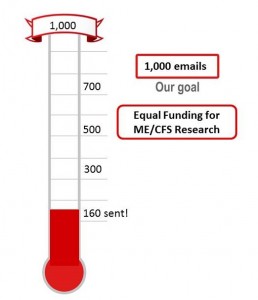The Power of the P2P and IOM: Pressure Builds for NIH To Increase Research Funding for ME/CFS
Two scientific reports in two months by experts independent of the ME/CFS field say the same thing: “The committee stresses that more research is urgently needed.” A window of opportunity has opened. Now we must work together to push the National Institutes of Health to increase funding for research. Join us by emailing the Secretary of Health and Director of NIH for equal funding for ME/CFS research!
The Institute of Medicine, an arm of the widely-respected National Academy of Sciences, and the National Institute of Health’s own Pathways to Prevention Program have issued urgent calls to federal health agencies and the NIH to conduct more medical research into the causes and treatments for ME/CFS.
“Remarkably little research funding has been made available to study the cause of ME/CFS, mechanisms associated with the development and progression of the disease, or effective treatment, especially given the number of people affected.” Institute of Medicine
“Unfortunately, ME/CFS is an area where the research and medical community has frustrated its constituents, by failing to assess and treat the disease and by allowing patients to be stigmatized….Over the last 20 years, minimal progress has been made to improve the state of the science for patients with ME/CFS…. Innovative biomedical research is urgently needed to identify risk and therapeutic targets, and for translation efforts.” NIH Pathways to Prevention Report
The power of the P2P and IOM reports lie in their remarkably similar conclusion: that ME/CFS is a complex and serious physiological disease that urgently requires greatly increased levels of rigorous, evidence-based research. The fact that many of the authors were independent scientists with no connection to ME/CFS gives the reports that much more weight.
Best Opportunity in Decades to UNITE for Equal Funding!
We have powerful ammunition from prestigious institutions to press for equal research funding from the NIH. The need isn’t new, but having demands from well-respected institutions outside of our illness is.
Please take positive action to raise the pressure for #EqualFunding for ME/CFS. We can make this opportunity bigger by organizing our community to speak with one voice on the need for more research funding.
EMAIL CAMPAIGN
Email Secretary of Health Burwell and NIH Director Collins with this draft email. Help us reach a goal of 1,000 emails to the Secretary of Health and NIH Director. We ask you to cc the White House and Courtney, so that we can know how many emails are sent.
INSTRUCTIONS:
- Click the PDF button at the bottom of this blog to make copying easier!
- Then copy and paste the email addresses and the email text into your own email message, and feel free to add your own personal story.
- Please ask friends or family members to also send an email. They may have to change a few phrases, since we drafted it from patients.
TEMPLATE
Email addresses:
To: sylvia.burwell@hhs.gov, scheduling@hhs.gov, francis.collins@nih.gov, collinsf@od.nih.gov, brewera@od.nih.gov
Cc: jarrettpublic@who.eop.gov, courtneymiller999@gmail.com
Re: Equal Funding for Chronic Fatigue Syndrome (ME/CFS) Research
Dear Secretary Burwell and Dr. Collins:
I am disabled with ME/CFS, and I am writing to ask you to raise research funding for my disease to a level of $100 million annually, equal to illnesses like Multiple Sclerosis and Systemic Lupus.
I want to highlight two scientific reports commissioned by HHS that were released in the last two months by experts independent of the ME/CFS field. They say the same thing: “The committee stresses that more research is urgently needed.”
The Institute of Medicine, an arm of the widely-respected National Academy of Sciences, and National Institutes of Health’s Pathways to Prevention Program have issued urgent calls to federal health agencies and the NIH to conduct more medical research into the causes and treatments for ME/CFS.
“Remarkably little research funding has been made available to study the cause of ME/CFS, mechanisms associated with the development and progression of the disease, or effective treatment, especially given the number of people affected.” Institute of Medicine
“Unfortunately, ME/CFS is an area where the research and medical community has frustrated its constituents, by failing to assess and treat the disease and by allowing patients to be stigmatized….Over the last 20 years, minimal progress has been made to improve the state of the science for patients with ME/CFS…. Innovative biomedical research is urgently needed to identify risk and therapeutic targets, and for translation efforts.” NIH Pathways to Prevention Report
NIH currently funds only $5 million annually for CFS research, despite the 1-2.5 million Americans suffering with the disease. That is not enough funding to spur breakthrough science, and I suffer without any FDA-approved treatments.
By contrast, illnesses with fewer patients such as Multiple Sclerosis and Systemic Lupus receive more than $100 million annually in NIH research funding. Those diseases now boast diagnostic tests and many FDA-approved treatments because of the high quality research NIH has funded in those fields. That is what patients like me so desperately need, and I believe that is what it takes to fulfill President Obama’s 2012 commitment to elevate CFS at the NIH.
I have no treatments and I am very ill. The FDA rejected the only medication produced for ME/CFS in clinical trials in 2013. Please help me by funding medical research into ME/CFS equally and urgently, so I can get well and return to work and my life.
Patient Name:
Years Ill:
State:









Done. Thanks so much Cort for organizing things like this. We must make what noise we can when any opportunity arises. Sometimes these doors close for decades at a time and don’t we all know that story?
just sent!!!
Delighted to see this Cort – and thanks for doing this, Bob. 🙂
Personally I’d like to have seen per-patient funding parity at $250m… 😉
Done! Thank you so much for making this so easy to do Cort, Bob and Courtney. This is especially timely since May 12th is International ME/CFS & FM Awareness Day. I haven’t tried yet but assume it can be pasted to Face Book and other social media to spread the word. Thank you for continuing to fight the good fight.
Done. Thanks, Cort, Courtney, Bob.
Done. Many thanks for your efforts.
It would be good to get running updates on how many emails have been sent, if that’s possible – I think that’s always encouraging!
I’d really like to see numbers also, please.
Agreed. Feedback and goals are important to show active progress and stimulate participation (think PBS fundraising).
Let’s also take to the forums to spread this message.
Done! Thank you all for once again giving me a voice in this disease!
Done. Thanks for the template, Cort.
Done. Thank you
Done. Thanks so much for the template!
Sent. Thank you for your hard work on this.
If you’re reading this and feel too tired to compose this email, or think you’re too late, or think you’re just one voice, stop and find a way. We desperately need to band together to enact positive change. An increase in federal funding for CFS research will be a monumental step forward towards ending our suffering.
It wouldn’t hurt to send an email to Newt Gingrich. He just wrote an op-ed in the New York Times calling for the NIH budget to be DOUBLED. I’m a hardcore liberal and never thought I’d be agreeing with this guy, but he’s saying what ME patients have said for years: if you give us treatment and research a cure, we wouldn’t need to use billions in social services!
I’ve been thinking he could use ME as an example as he tries to get support for this idea.
In his own words:
“House and Senate negotiators are at work on a budget resolution for the fiscal year that starts on Oct. 1, and the N.I.H. should be a priority. Doubling the institutes’ budget once again would be a change on the right scale, although that increase should be accompanied by reforms to make the N.I.H. less bureaucratic, to give the director more flexibility to focus resources on the most common and expensive health problems, and to place a stronger emphasis on truly breakthrough research.”
http://www.nytimes.com/2015/04/22/opinion/double-the-nih-budget.html?_r=0
Good idea. Do you know his email address?
Why don’t all of you just post your comments and status on the FB pages for FDA/HHS/NIH? You can also write to the President at http://www.whitehouse.gov/contactus Valerie Jarret also has twitter page and you can post the link there too.
I also have a petition on the same subject which already has 1380 signatures.
http://www.thepetitionsite.com/490/782/145/more-nih-funding-for-mecfs-research/
Done!
I signed the petition & will share the link with my ME/CFS groups.
Thank you Cort for tremendous work you do. Done !
May Canadians participate, in other words will it help? This will be an election year in Canada, we need to write some letters in Canada as well for more funding.
I don’t see why not. I would go for it!
done! thanks for organizing this
Thanks for providing a template. I made a few changes but kept almost all of it.
I just sent my message a few minutes ago. Let’s hope this does some good!
Just a quick note about the #equalfunding hashtag. It’s being used by some already for school funding.
Maybe we need a more ME/CFS/SEID specific hashtag?
I’m no advocacy expert, though, so maybe it doesn’t matter.
Done and with copies to 122 family and friends with a request that each of them send the email too. Let’s really spread this around – Facebook and other social media – maybe can hit 5,000 e-mails.
Great job, Jody. Did you send them the link to the petition that Marilyn (above) mentioned?
Thank you, Cort. So important.
Done!
Sent as directed with personal experience added to email. Also sent to President Obama(will only allow 2500 characters), Congressman Dave Joyce, Senator. Rob Portman, Senator Sherrod Brown,
Done. Thanks for another great job on your part, Cort!
Done! Thank you for formatting this for us and for all you do….
Thank you! It feels good to be able to do any little something.
I added “Personal Impacts” below years ill… I thought it would be nice to point out how delayed diagnosis means unemployment without benefits. : )
Done. Also sent a separate modified letter to President Obama. Thank you for making it easy to send this out.
Done. Thanks, Cort. could not get email addresses for Burwell and Jarrett to work, and couldn’t find Burwell’s email address on HHS website. How strange…. Sent to the others anyway. Thanks again for doing this.
would it be at all useful to you guys if someone from the UK took part? I imagine they would just dismiss the opinions of someone in another country but willing to do it if it will help x
Is there a letter / template available for someone who does not have me/cfs that would be happy to support this cause?
Done. Thanks for laying this out so clearly.